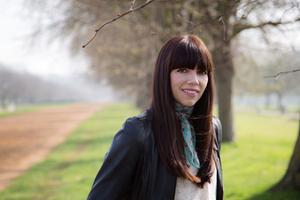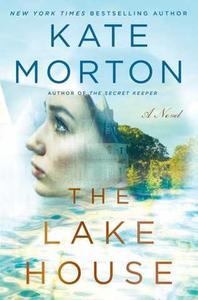
|
|
| photo: Davin Patterson | |
Australian native Kate Morton holds degrees in dramatic arts and English literature. She is the award-winning author of five novels, including The House at Riverton and The Secret Keeper. Her most recent novel is The Lake House (reviewed below). Morton lives with her family in Brisbane, Australia.
With the obvious joy and passion that Kate Morton instills in her work, it may be hard to believe that she didn't always aspire to write. "It never occurred to me that it was a job that real people could do. I don't know where I thought all the books I read were coming from, but it wasn't like now, where kids know who J.K. Rowling is and there're authors in schools," Morton says. Instead, she studied to be an actress but didn't end up pursuing a career in theater. "I did love it, but I had a limited idea about the kind of actress I wanted to be. I wanted to be on the stage doing Shakespeare and that was it. I don't know that I could have made a career out of that, certainly not in Australia," she explains.
So what triggered Morton's entry into the literary world? "A friend who's a writer made an off-the-cuff comment one day: 'Lots of people want to write, but you've really got to have a stubborn nature. You'd be able to finish a book.' I bought a notebook and wrote down an idea and started and that was it," she says. And she still begins each new book this way. Much like her character Alice, a mystery writer, in The Lake House, Morton has shelves of these notebooks. "I am quite pathological about my notebooks. I need to have one; I feel quite unhinged if I don't have one to jot ideas down in even if I never go back and read it. Something about that process from brain through fingers to paper sort of locks it in for me."
So from brain to fingers to paper, each of Morton's highly successful novels take shape. "Before I start writing--and this is almost my favorite part of the whole process--I spend about three or four months scribbling in my books. I can fill three or four of them just to come up with the one page of what the idea is. But all that work gives the color and the texture and the feel; the synopsis is never just a page of writing. I can then read it and the echoes of all of that scribbling come back and it's like a place I've been before," she describes. However, these months are just the beginning of researching and shaping her meticulously detailed novels, set in multiple time periods. "Because my books are so long and take so long to write, I take notes as I go and I research as I go. And I don't always know from the beginning that, say, shell shock will become as important as it does, so then I need to research shell shock or whatever the case may be. There are innumerable small research detours that I take along the way. And some of them end up being edited out and aren't important while others become fundamental."
This process is similar in form for each of Morton's novels, but the inspirations vary greatly. For The Lake House, the inspiration stems from two seeds she was able to merge artfully into one enchanting story. "A book is thousands of ideas put together in hopefully the right order, but I had these two vivid ideas, and one was a missing child story. I had in mind a real-life Australian case called the Beaumont case--the Beaumont children were three siblings who disappeared in 1966 on a really hot Australia day. They went to the seaside by themselves and they didn't go home. They were never found, and to this day no one knows what happened to them. It changed the way people parented in Australia. I was thinking about that and at the same time an e-mail came to me, with pictures of a French apartment that had been locked up in the 1940s; the person who owned it had disappeared and it had just been re-opened again. The person who sent it said, 'This sounds like one of your books.' That is one of my books, gosh, what happened to that apartment? Where's the owner? How can I turn this into a story?" Feeling certain she didn't know enough about France to write a book set there, she considered Australia as a setting. Then Morton experienced an epiphany while talking to her English publisher: "She said, 'well, you know, there are abandoned houses in England, too.' And all of sudden the two ideas came together--the missing child and the abandoned house, and I had my story."
 That story is the multi-layered tale of a kidnapping in 1930s Cornwall that goes unsolved and resurfaces in 2003 when a young police detective happens upon the long-forsaken home where the crime occurred. The use of multiple time periods is not new to Morton. "I don't seem to ever get tired of exploring that sort of story. I love history, but I love history even more when I'm looking at how much it's reached into the present world. I love visiting old houses, walking down a cobbled laneway now and imaging the clatter of horse hooves and women in Edwardian skirts, I just love that sort of conflation of the past and the present. So I guess it stands to reason that in my books, it's where I choose to spend most of my time." And her interest in history has personal benefits as well: "I have three sons and history gives you an excuse to talk about swords and war."
That story is the multi-layered tale of a kidnapping in 1930s Cornwall that goes unsolved and resurfaces in 2003 when a young police detective happens upon the long-forsaken home where the crime occurred. The use of multiple time periods is not new to Morton. "I don't seem to ever get tired of exploring that sort of story. I love history, but I love history even more when I'm looking at how much it's reached into the present world. I love visiting old houses, walking down a cobbled laneway now and imaging the clatter of horse hooves and women in Edwardian skirts, I just love that sort of conflation of the past and the present. So I guess it stands to reason that in my books, it's where I choose to spend most of my time." And her interest in history has personal benefits as well: "I have three sons and history gives you an excuse to talk about swords and war."
While swords aren't as common in Morton's novels, war certainly is. "Historically, wars are times of transition so they are very ripe periods to write about, not just the war, but what was happening at home socially. It's a very fruitful period to write about," she explains. In The Lake House, Morton examines the psychological effects of war on soldiers and those they return home to. "Shell shock--or post-traumatic stress disorder--is interesting in and of itself, but I wanted to take the other view and look at it from the perspective of the person who's been left at home, who loves the person who's suffering and never gives up hope that she'll find a way to fix him and put it all back together and make it how it used to be. I found that a very compelling thing to write about."
In the 2003 events of The Lake House, Morton introduces a new type of character for her: Sadie, a policewoman. But, Morton explains, "I always think of myself as a mystery writer even though nobody else on the planet does. I decided this book will be more explicitly a mystery story. So I'm going to have a detective. The challenge in my books is always, I've got to have a detective-type character who performs that function but they're not actually a detective. So I thought, 'Well, this time I'm just going to have a detective and then she can just be solving the mystery. Straight out, I won't have to hide it. That's what she's doing.'" But Sadie has other unique characteristics. As Morton points out, "It's very tempting as a writer to write characters like yourself--you know I love books and I use expressions like 'down the rabbit hole'--but I told myself, 'I'm going to set myself the challenge of writing a female contemporary character who doesn't read books. That's not her world. She's very different. She goes for runs and she doesn't go into libraries, and I'm going to see if I can do that.' " Kate Morton can now record that challenge as accomplished.
Writing plays an integral part in The Lake House, but is writing as relative to today's readers? Morton feels that it certainly is. "I think we've actually had a bit of a return to periods like the late Victorian, when lots of people kept diaries and scrapbooks. In today's online world, a lot of people who weren't writing things down are: they're keeping blogs or they're on Facebook or they've got Instagram accounts. People are writing all the time now because e-mail makes it so easy to communicate. People are taking photos on their smart phones and sending them around and getting those apps where you can join them together and make montages and tell stories and make little films. When I was growing up in the '80s, there was probably less writing because there wasn't the technology that makes it fun. So, in a way, people are, I think, curating aspects of their own life in written and visual form just as much as they did in the past. It's not quite so easy to discover in a trunk in the attic, but people are still recording."
As is Morton. She's excited about what's to come after The Lake House. "When I was deciding what to write for book number five, I was tossing up between the idea for The Lake House and another idea, which you'll be shocked to hear takes place in a big, old house full of secrets and history and mystery. I chose The Lake House, so I shelved the other one because you never know whether the urge or the drive will still be there. I pulled it out very carefully the other day and looked through it again and I felt the realizing of those fires. So now I just need to find the little extra bits that were missing last time and stopped me from writing it, because I think it's a good idea." --Jen Forbus of Jen's Book Thoughts

